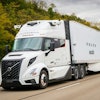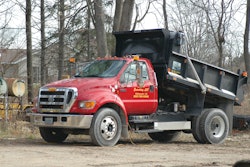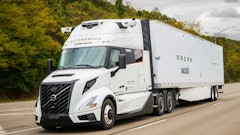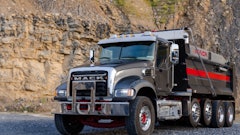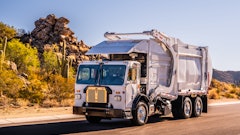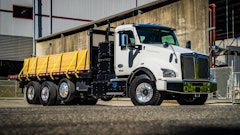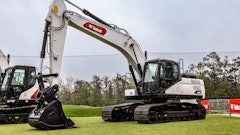Natural gas can be stored as compressed natural gas (CNG) or liquefied natural gas (LNG) for use on mobile vehicles. The main difference is that CNG is stored under pressureas at 2,900 to 3,600 psi, while liquefied natural gas is stored as a liquid at very low temperature.
Storage volume required per unit of energy is larger for both fuels. “LNG requires a volume of about 1.7 times that of diesel to store an equivalent amount of energy,” says Caterpillar’s Scott Fiveland. “CNG systems, depending upon the degree of pressurization (usually 3,600 psi), require upwards of four times [the volume] relative to diesel and 2.5 times relative to LNG. In key industries, LNG fuel systems will be designed to continue to meet key customer requirements while not sacrificing payload, etc.”
Natural gas storage tanks and more complicated fuel delivery systems will add cost the initial purchase price of the vehicle. “CNG requires roughly four to five times more chassis packaging space than the equivalent diesel volume, while LNG requires approximately two times the space,” says Roy Horton, Mack Trucks. “Due to the cryogenic nature of LNG, handling and facility impacts are also more challenging than diesel. And the new fuel management mindset required for LNG (use it or lose it) is also a negative.”
This makes adoption more difficult. “We do not see a demand for LNG within the vocational market,” says Horton. “The utilization rate for these trucks is typically not at a level that would benefit from this type of fuel. LNG is better suited for applications that have usage cycles and longer distance requirements.”
Greg Treinen, Freightliner Trucks, agrees, noting, “We have only sold a handful of LNG vehicles in straight truck configurations. The problem with LNG in vocational markets is that the trucks are not constantly running like over-the-road tractors. If LNG fuel is not used, you risk losing it because, as the LNG warms as it sits in the tank, it reverts back into a gas form and expands, causing it to vent out of the tank.”
“Storage issues — the fact that LNG vents when pressure/temperature increases — will drive customers to CNG over LNG unless they are in a high-fuel-usage application where a vehicle is in continual use,” says Nadine Haupt, Navistar.

